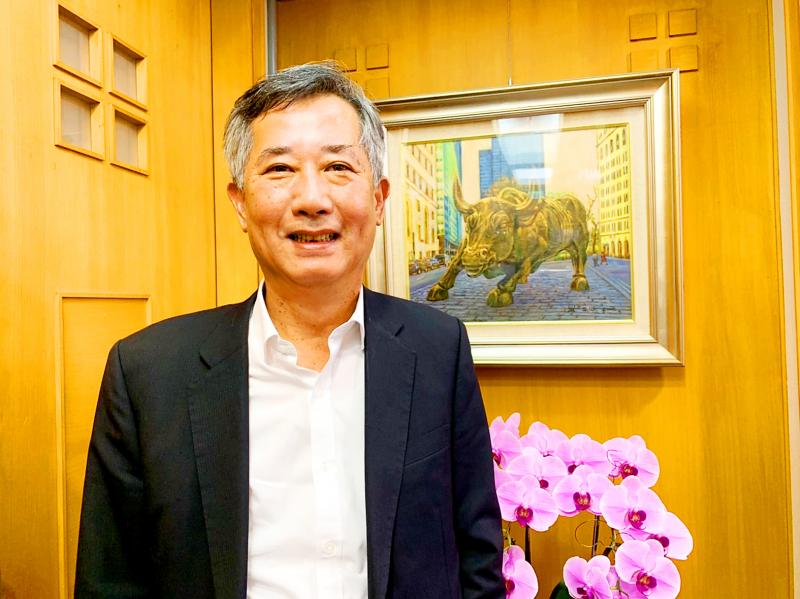United Integrated Services Co Ltd (UIS, 漢唐), which helps clients build manufacturing facilities and install clean rooms, yesterday said that it plans to set up a subsidiary in the US next year, following in the steps of its top client, Taiwan Semiconductor Manufacturing Co (TSMC, 台積電).
By managing costs well, UIS expects its US subsidiary to turn a profit in the first year of operation, company president Benny Chen (陳柏辰) told an investors’ conference in Taipei.
UIS is still in talks with TSMC about proceeding with its US fab construction project, Chen said.

Photo: Hung Yu-fang, Taipei Times
TSMC last week said that it plans to set up a wholly owned US subsidiary in Arizona with paid-in capital of US$3.5 billion after unveiling a plan to build a US$12 billion fab in the state.
UIS helps the world’s biggest contract chipmaker build manufacturing facilities, including the chipmaker’s most advanced factories, Fab 14 and Fab 18 in Tainan. Fab 14 produces 5-nanometer chips, the most advanced chips currently available, while Fab 18 is to enter volume production of 3-nanometer chips in the second half of 2022.
UIS gave an upbeat business outlook for next year, saying that revenue is expected to “remain steady” compared with this year, supported by resilient demand from overseas and robust domestic demand.
The company earlier this year forecast that revenue would hit a record high this year.
“This year, the company’s operation is boosted by explosive demand from Taiwan’s semiconductor market. Next year will be another good year; the semiconductor industry continues to be a major driver,” Chen said.
UIS has signed contracts totaling NT$43 billion (US$1.49 billion) with clients this year, Chen said, adding that NT$20 billion of that amount is to be realized by the end of this year
Only 10 percent of the NT$20 billion is coming from overseas markets, he added.
The US-China trade dispute has stalled factory construction plans in China this year, Chen said.
Some of the company’s Chinese clients might restart fab construction next year, but most of them would likely be less advanced fabs, he said.
UIS saw its net profit soar 55 percent year-on-year to NT$3.15 billion in the first three quarters of this year, from NT$2.03 billion in the same period last year. That translated into earnings per share of NT$16.52, up from NT$10.67.
Revenue skyrocketed 72 percent to NT$28.81 billion in the January-to-September period from NT$16.74 billion a year earlier.

STEEP DECLINE: Yesterday’s drop was the third-steepest in its history, the steepest being Monday’s drop in the wake of the tariff announcement on Wednesday last week Taiwanese stocks continued their heavy sell-off yesterday, as concerns over US tariffs and unwinding of leveraged bets weighed on the market. The benchmark TAIEX plunged 1,068.19 points, or 5.79 percent, to 17,391.76, notching the biggest drop among Asian peers as it hit a 15-month low. The decline came even after the government on late Tuesday authorized the NT$500 billion (US$15.2 billion) National Stabilization Fund (國安基金) to step in to buoy the market amid investors’ worries over tariffs imposed by US President Donald Trump. Yesterday’s decline was the third-steepest in its history, trailing only the declines of 2,065.87 points on Monday and

TAKING STOCK: A Taiwanese cookware firm in Vietnam urged customers to assess inventory or place orders early so shipments can reach the US while tariffs are paused Taiwanese businesses in Vietnam are exploring alternatives after the White House imposed a 46 percent import duty on Vietnamese goods, following US President Donald Trump’s announcement of “reciprocal” tariffs on the US’ trading partners. Lo Shih-liang (羅世良), chairman of Brico Industry Co (裕茂工業), a Taiwanese company that manufactures cast iron cookware and stove components in Vietnam, said that more than 40 percent of his business was tied to the US market, describing the constant US policy shifts as an emotional roller coaster. “I work during the day and stay up all night watching the news. I’ve been following US news until 3am

Six years ago, LVMH’s billionaire CEO Bernard Arnault and US President Donald Trump cut the blue ribbon on a factory in rural Texas that would make designer handbags for Louis Vuitton, one of the world’s best-known luxury brands. However, since the high-profile opening, the factory has faced a host of problems limiting production, 11 former Louis Vuitton employees said. The site has consistently ranked among the worst-performing for Louis Vuitton globally, “significantly” underperforming other facilities, said three former Louis Vuitton workers and a senior industry source, who cited internal rankings shared with staff. The plant’s problems — which have not

TARIFF CONCERNS: The chipmaker cited global uncertainty from US tariffs and a weakening economic outlook, but said its Singapore expansion remains on track Vanguard International Semiconductor Corp (世界先進), a foundry service provider specializing in producing power management and display driver chips, yesterday withdrew its full-year revenue projection of moderate growth for this year, as escalating US tariff tensions raised uncertainty and concern about a potential economic recession. The Hsinchu-based chipmaker in February said revenues this year would grow mildly from last year based on improving supply chain inventory levels and market demand. At the time, it also anticipated gradual quarter revenue growth. However, the US’ sweeping tariff policy has upended the industry’s supply chains and weakened economic prospects for the world economy, it said. “Now